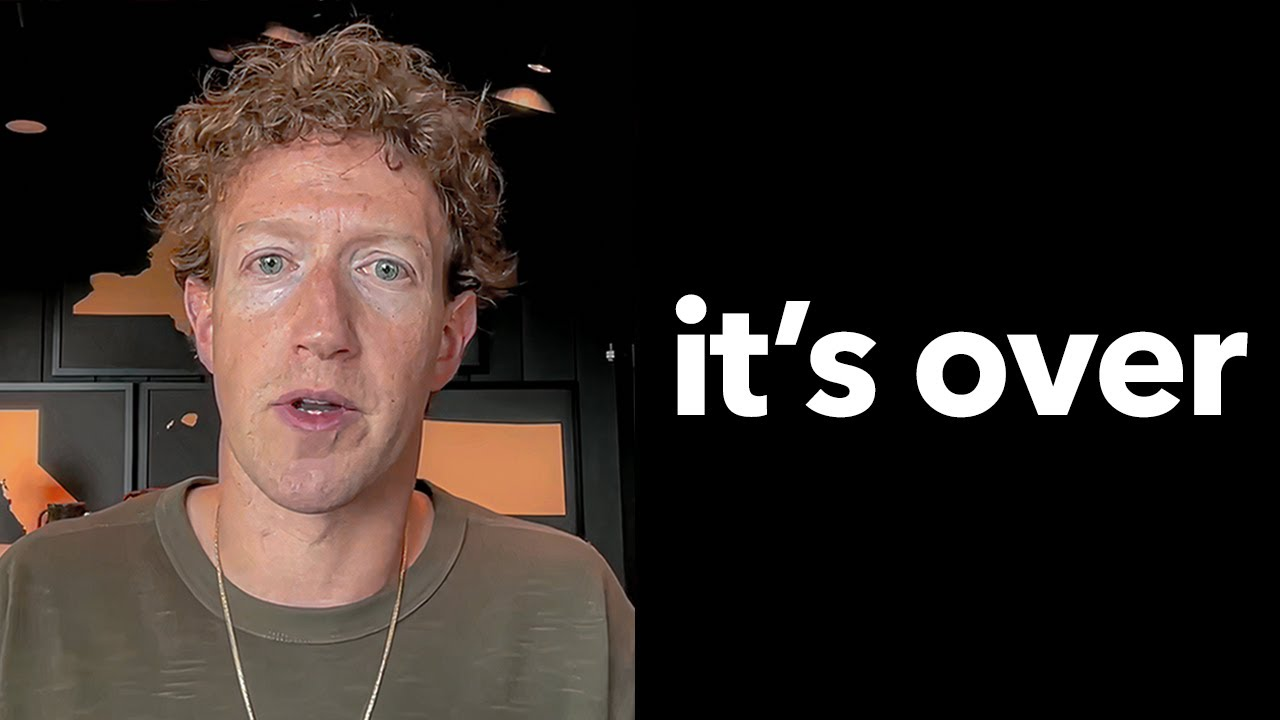In this video, Mark Zuckerberg discusses his vision for the future of AI, emphasizing a world dominated by open-source innovation through Meta's latest AI model, Llama 3.1. Zuckerberg highlights the competitive edge of Llama 3.1 against closed models like those from OpenAI, boasting it has the most sophisticated 405 billion parameter model. He believes in making AI more accessible, pushing for numerous AI agents to proliferate around the world. Zuckerberg draws parallels to Linux in the tech industry, underscoring how open-source systems, once considered inferior to closed ones, eventually gained significant advantages in terms of cost, security, and customization.
Zuckerberg's approach involves democratizing AI by allowing developers to use the 405 billion parameter Llama 3.1 model to create and refine smaller models, promoting a massive partner ecosystem. He discusses how open-source AI may become an industry standard, leading to a future where various AI models are customized for different purposes, rather than relying on a singular, closed-source AI. Zuckerberg's strategy aims to outmaneuver closed-source competitors by providing a free, open AI model that encourages widespread adoption and customization, ultimately fostering innovation and growth.
Main takeaways from the video:
Please remember to turn on the CC button to view the subtitles.
Key Vocabularies and Common Phrases:
1. Ubiquitous [juːˈbɪkwɪtəs] - (adj.) - Present, appearing, or found everywhere.
Because at that point it becomes Ubiquitous, it becomes a commodity.
2. Scorched earth [skɔːrtʃt ɜːrθ] - (phrase) - A military strategy that involves destroying anything that might be useful to the enemy.
Zuck's strategy seems to be tried and tested here. Basically when you're behind in a technology race the strategy that you employ is called Scorched earth.
3. Distill [dɪˈstɪl] - (v.) - To extract the essential meaning or most important aspects of something.
We've distilled the 405 billion parameter model down to make newer and updated...
4. Inflection point [ɪnˈflɛkʃən pɔɪnt] - (n.) - A point of a curve at which a change in the direction or curvature occurs.
So I think that this moment with Lama 3.1 is kind of like that Inflection point where I think Lama has the opportunity...
5. Incentive [ɪnˈsɛntɪv] - (n.) - A thing that motivates or encourages someone to do something.
But now we don't see that anymore right now as open source basically closes the gap. I think you're just going to see this wide Proliferation of models where people now have the Incentive to basically customize and build...
6. Proliferation [prəʊˌlɪfəˈreɪʃən] - (n.) - Rapid increase in numbers.
I think you're just going to see this wide Proliferation of models...
7. Sophistication [səˌfɪstəˈkeɪʃən] - (n.) - The quality of being sophisticated, having a great deal of worldly experience and knowledge of fashion and culture.
There hasn't been an open source or open weight model of kind of this Sophistication that's ever been released before.
8. Monopolize [məˈnɑːpəˌlaɪz] - (v.) - To obtain exclusive possession or control of a trade, commodity, or service.
If you build a closed system, then eventually there are all these forces on you that push you to, to clamp down on things...
9. Dependent [dɪˈpɛndənt] - (adj.) - Contingent upon something else.
They are defining their own agent architecture, it seems, or its own language.
10. Vulnerable [ˈvʌlnərəbl] - (adj.) - Exposed to the possibility of being attacked or harmed, either physically or emotionally.
Not only do I think it's safe, I think it's safer than the alternative of closed development.
Meta's Open Source Revolution with Llama 3.1
In this video, Mark Zuckerberg discusses his vision for the future of AI, emphasizing a world dominated by open-source innovation through Meta's latest AI model, Llama 3.1. Zuckerberg highlights the competitive edge of Llama 3.1 against closed models like those from OpenAI, boasting it has the most sophisticated 405 billion parameter model. He believes in making AI more accessible, pushing for numerous AI agents to proliferate around the world. Zuckerberg draws parallels to Linux in the tech industry, underscoring how open-source systems, once considered inferior to closed ones, eventually gained significant advantages in terms of cost, security, and customization.
Zuckerberg's approach involves democratizing AI by allowing developers to use the 405 billion parameter Llama 3.1 model to create and refine smaller models, promoting a massive partner ecosystem. He discusses how open-source AI may become an industry standard, leading to a future where various AI models are customized for different purposes, rather than relying on a singular, closed-source AI. Zuckerberg's strategy aims to outmaneuver closed-source competitors by providing a free, open AI model that encourages widespread adoption and customization, ultimately fostering innovation and growth.
The conversation covers the implications of open-source AI, potential challenges, and strategies for overcoming them. Zuckerberg delves into the benefits of open-source approaches for ensuring AI safety, involving the tech community to scrutinize and examine AI systems, thereby reducing potential harms. He highlights the importance of open ecosystems in promoting innovation in AI, pointing out the potential dangers of a closed-system model where development might be restricted and controlled by a few companies.
As the discussion progresses, Zuckerberg shares his views on the economic opportunities that AI, particularly open-source AI, presents. He envisions a massive impact on productivity and creativity, democratizing access to AI technologies for startups, individual developers, and even nations that may lack resources. Emphasizing the potential for AI to enhance various sectors, he stresses the significant benefits and progress that can arise by moving towards a more open and collaborative AI development approach.
Zuckerberg also addresses the philosophical differences between open and closed technological development, reflecting on his experiences with social media platforms over the years. He urges for an open ecosystem akin to the web, contrasting it with the pitfalls of closed environments which may lead to monopolistic practices. Concluding on a hopeful note, the video outlines Zuckerberg’s aspirations for an inclusive AI future that lifts all boats, providing wide-ranging benefits equitably across the globe.
Technology, Artificial Intelligence, Innovation, Open Source, Mark Zuckerberg, AI Agents

